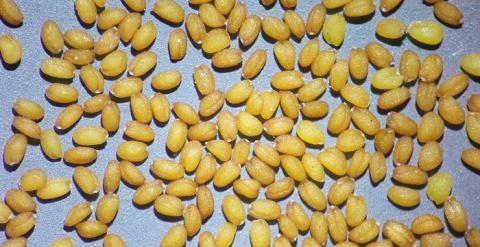Keeping balanced under stress
Keeping balanced under stress
A new study from the Angelovici lab finds that Arabidopsis seeds maintain their amino acid composition under water stress.
Seeds are essential for human and animal nutrition. When it comes to a seed’s nutritional value, a lot depends on genetics. Some varieties of corn, for example, produce more nutritious seeds than others. But environmental conditions also affect seed development and, hence, their nutritional value. A new study from Ruthie Angelovici’s lab looked at the effect of water stress on the amino acid composition of developing seeds.
“With climate change affecting the availability and distribution of rainfall and the occurrences of drought, it is imperative that we understand how these changing circumstances will affect the nutritional value of seeds we rely on for food,” said Angelovici. “The impact on the amino acid composition of seeds was of particular interest to us because it is important to a seed’s nutritional value to humans as well as to plant growth.”
The researchers analyzed seeds from Arabidopsis thaliana plants exposed to a range of water-stress conditions at the point when seed set began. The conditions mimicked limited amounts of rainfall, water limitation, and various degrees of severe drought. The researchers analyzed various seed characteristics, including their amino acid composition, and compared them to seeds collected from well-watered plants.
Not surprisingly, they observed the biggest effects in the seeds of plants exposed to the most severe conditions, although the impact on the seed varied by the type of stress imposed. For example, plants exposed to severe water limitation had fewer but bigger seeds, while plants exposed to severe drought had fewer but smaller seeds. The impact on the contents of the seeds – nitrogen, carbon, lipids, and amino acids levels — also varied by the type of stress imposed. To their surprise, however, the researchers found that even under the most severe drought conditions, the plants balanced the seed’s amino acid composition so that the overall composition was little effected.
Seeds have two pools of amino acids, free and protein bound. Their analyses showed that the two pools, although interdependent, responded differently to specific environmental conditions. Two distinct molecular mechanisms facilitated balancing of the protein bound amino acid composition: proteomic maintenance in response to water limitation and proteomic rebalancing in response to water deprivation.
“We can conclude that water stress imposed during the seed setting stage does not affect seed quality, in terms of overall amino acid composition, despite a decrease in yield and seed size. Moreover, seeds produced from the most severe treatments were able to germinate the same way as those harvested from well-watered plants, which means that plants have inherent mechanistic adaptations that allow them to respond to drought stress in a way that guarantees their transition to the next generation,” said lead author Abou Yobi, who is a postdoctoral fellow in the Division of Biological Sciences.
This may be good news for both farmers and consumers, said Yobi. “Our findings suggest that even seeds collected from the most severely stressed plants might be used for the next growing season, or if consumed could provide the same nutritional value, in terms of amino acid composition, as those harvested from unstressed plants.”
The research also may help scientists boost the nutritional value of seeds, said Angelovici. “Most seed crops lack sufficient quantities of the essential amino acids we need to live. Understanding how amino acids accumulate in seeds and the role the environment plays in shaping their levels and composition is important if we want to enhance the nutritional quality of seed crops without impacting the health of the plant or seed yield.”
In addition to Angelovici and Yobi, other authors of the article are Clement Bagaza, a former undergraduate in the lab (now at UMSL); Vivek Shrestha, Marianne Emery; Samuel Holden, Sarah Turner-Hissong, and Thomas P. Mawhinney, with the University of Missouri; Albert Batushansky with Oklahoma Medical Research Foundation; and Nathan D. Miller with the University of Wisconsin.
Yobi, A., Bagaza, C., Batushansky, A., Shrestha, V., Emery, M.L., Holden, S., Turner-Hissong, S., Miller, N.D., Mawhinney, T.P., Angelovici, R. The complex response of free and bound amino acids to water stress during the seed setting stage in Arabidopsis (2020) Plant Journal, 102 (4), pp. 838-855. (https://doi.org/10.1111/tpj.14668)


